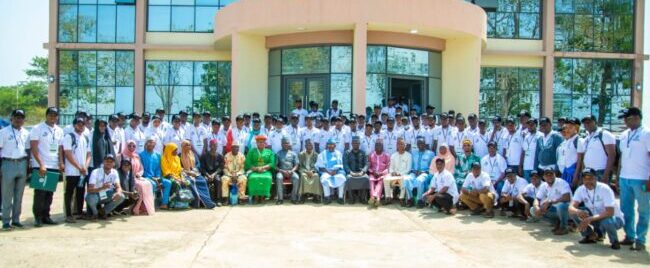Kwara state government has trained no fewer than 400 farmers and extension agents on improved crop residue utilisation by ruminants in one year.
Kwara Livestock Productivity and Resilience Support (L-PRES) along with Centre for Dryland Agriculture, Bayero University, Kano (BUK) carried out the training packaged by Synergy Impact Limited at the National Centre for Agriculture Mechanisation (NCAM), Idofian, Ifelodun local government area of the state.

Declaring the weeklong training, tagged, “Capacity building for new set of 100 extension agents/farmers on small ruminants production and crop residue processing for improved utilization by ruminants”, Governor Abdulrahman Abdulrazaq urged the trained farmers to allow what they had learnt to trickle down to local farmers in their various communities.
The governor also said that the state, in collaboration with Hydroelectric Power Producing Areas Development Commission (HYPPADEC), has been supporting farmers in flood-prone areas of the state.
Represented by the Secretary to the State Government (SSG), Professor Mamman Jibril, the governor said that climate change had come to stay, urging the farmers to take note of that.
“Climate change has many effects on the soil, flooding, amount of rainwaters and on forest. As a result of that, we have to be up and doing as climate change will not cease.
“That is why these days farmers in Kwara North prefer dry season to plant their rice. Because if they do during raining season, flood will wash away their crops.
“By now they are busy preparing their land to plant their crops especially rice, waiting for what assistance government will give them. But, the state government with HYPPADEC has been of immense support for them”, the governor added.
Earlier, Kwara state commissioner for Agriculture and Rural Development, Mrs. Olutoyosi Thomas, said that the ministry planned to train youth across the three senatorial districts on agricultural practices.
Mrs. Thomas, who was represented by Director Personnel and Finance, Mayaki Babasoko, urged the farmers to share the knowledge acquired with others.
Also speaking at the close of the training, Manager, BUK Centre for Dryland Agriculture, Dr. Akeem Ajeigbe, said that “livestock, especially, the large and small ruminants, will largely rely on crop residue for feed.
“By 2050 Nigeria’s population will be about 300 million. The implication is that we are going to have less land for agriculture. It means crops and livestock must integrate because there will no longer be grazing land. Already, there is no fallow land.”
ALSO READ FROM NIGERIAN TRIBUNE
Kwara govt launches 100% eco-friendly briquette alternative to charcoal







